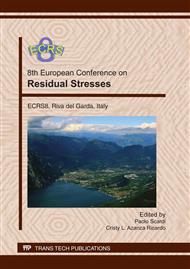p.315
p.321
p.327
p.332
p.340
p.346
p.352
p.358
p.364
Residual Stress in Tools and Components in Case of Thermo-Mechanical Metal Forming Processes
Abstract:
Residual stresses play a key role in thermo-mechanically coupled forming processes for industrial mass production. They are an unavoidable consequence of the alternating inhomogeneous fields of temperature and mechanical stress developing in tools and components dependent on the process parameters applied. Because of their influence on the behavior of the components produced, a great interest exists to get reliable information about origin and distribution of the relevant residual stress fields and to understand the basic principles of their formation. In this paper the development of residual stress in tools (steel AISI H11) used for the thermo-mechanical forming operation of cylindrical flange shafts (steel SAE 6150) is outlined. The loading situation of the tool is simulated by thermal fatigue tests, providing information about cyclic stress and plastic deformation during the manufacturing process. Furthermore the residual stress states of the flange shafts manufactured are presented and discussed. Chip forming manufacturing operations are challenging tasks and tensile residual stresses can be avoided using adapted process parameters.
Info:
Periodical:
Pages:
340-345
DOI:
Citation:
Online since:
March 2011
Authors:
Keywords:
Price:
Сopyright:
© 2011 Trans Tech Publications Ltd. All Rights Reserved
Share:
Citation:


